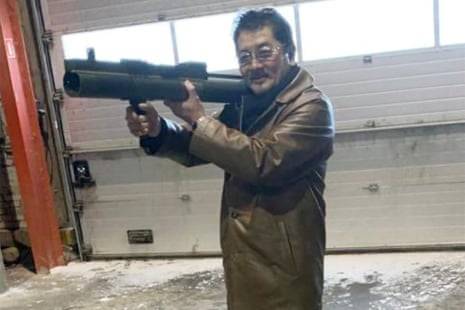Takeshi Ebisawa: The Yakuza Leader Caught in a Web of Nuclear Deceit.
In a shocking revelation, Takeshi Ebisawa, an alleged leader of Japan's infamous Yakuza crime syndicate, has pleaded guilty to trafficking nuclear materials from Myanmar. This stunning admission is part of a larger global web of illicit trades involving drugs, weapons, and laundered cash, as uncovered by the US Department of Justice.
The investigation, led by the US Drug Enforcement Administration (DEA), began in 2021, when Ebisawa attempted to sell nuclear materials, including uranium and weapons-grade plutonium, to an individual he believed was an Iranian general. The general, allegedly, intended to use these materials for a nuclear weapons program. This brazen attempt to peddle nuclear materials highlights the alarming threat posed by rogue individuals and organizations seeking to exploit the global black market.
Ebisawa's actions were uncovered during an undercover operation, where he was caught on camera discussing the sale of nuclear materials. The DEA, in collaboration with Thai authorities, seized the nuclear samples, which were later analyzed by a US nuclear forensic laboratory. The results confirmed that the samples contained detectable quantities of uranium, thorium, and plutonium, with the plutonium being of weapons-grade quality.
The charges against Ebisawa include conspiracy to commit international trafficking of nuclear materials, international trafficking of nuclear materials, and narcotics importation conspiracy. He faces a maximum of 20 years in prison for the nuclear materials trafficking charges and a mandatory minimum of 10 years in prison for the narcotics importation conspiracy charge.
Ebisawa's case is a stark reminder of the dangers of nuclear proliferation and the importance of international cooperation in preventing the spread of nuclear materials. The US Department of Justice has commended the efforts of the DEA and its international partners in disrupting this global web of illicit trades.
As the world grapples with the challenges of nuclear security, this case serves as a wake-up call for governments and law enforcement agencies to remain vigilant and proactive in preventing the trafficking of nuclear materials. The consequences of inaction could be catastrophic, and it is imperative that we continue to work together to prevent the spread of nuclear materials and ensure global security.
The Yakuza, Japan's largest and most powerful organized crime syndicate, has a long history of involvement in illicit activities, including narcotics trafficking, extortion, and money laundering. However, Ebisawa's case marks a disturbing escalation in the Yakuza's involvement in the global black market, highlighting the need for increased cooperation between law enforcement agencies to combat this threat.
In recent years, the Yakuza has expanded its operations globally, establishing connections with other organized crime groups and exploiting vulnerabilities in the global financial system. This has enabled them to launder millions of dollars in illicit proceeds, further solidifying their grip on the global underworld.
Ebisawa's guilty plea serves as a significant milestone in the fight against nuclear materials trafficking. It highlights the importance of international cooperation and the need for continued vigilance in preventing the spread of nuclear materials. As we move forward, it is essential that we remain committed to ensuring global security and preventing the catastrophic consequences of nuclear proliferation.
The international community must continue to work together to disrupt and dismantle the global networks of nuclear materials traffickers. This requires increased cooperation and information-sharing between law enforcement agencies, as well as the development of more effective strategies to prevent the spread of nuclear materials.
In conclusion, the case of Takeshi Ebisawa serves as a stark reminder of the dangers of nuclear proliferation and the importance of international cooperation in preventing the spread of nuclear materials. As we move forward, it is essential that we remain vigilant and proactive in combating this threat, ensuring that the catastrophic consequences of nuclear proliferation are never realized.




No comments yet
Be the first to share your thoughts!